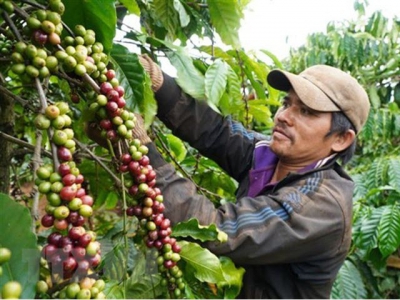Vietnams coffee export predicted to grow higher

Hanoi – The Institute of Policy and Strategy for Agriculture and Rural Development has forecast that Vietnam’s coffee export will increase in coming months on the back of growing global demand and free trade agreements.
According to the Vietnam Coffee – Cocoa Association, coffee export will reach nearly 130,000 tonnes monthly in November and December. If export prices remain high like at present, it could bring home additional 600 million USD, bringing the yearly total to 3 billion USD.
Due to the COVID-19 pandemic, the sale of coffee materials has met difficulties. With disruptions in supply from Vietnam and Brazil and hiking logistics costs, the world coffee prices are predicted to rebound in the coming time, prompting Vietnamese farmers to switch to growing them again after two years of inter-cropping practice.
At present, the Central Highlands provinces are harvesting coffee but facing shortage of workers caused by the pandemic.
The Dak Nong provincial Department of Agriculture and Rural Development reported that during the 2021-2022 crop, Dak Nong has over 130,000ha of coffee and needs about 13 million workers for harvest. However, only half of the workforce needed are available.
Provinces have built their own plans to pool workforce for coffee harvest depending on four levels of the pandemic risks.
In ten months of this year, Vietnam exported 1,286 tonnes of coffee worth 2.45 billion USD, down 4.2 percent in volume and up 5.4 percent in value year-on-year. Its biggest market was the European Union with a revenue of around 769 million USD, down 17 percent annually. ASEAN spent 259 million USD on importing Vietnamese coffee, marking an annual decrease of 19.45 percent.
Vietnam’s shipments of coffee to Germany, the US and Italy also dropped by 1.52 percent, 20 percent and 2.53 percent, respectively, to 319 million USD, 189 million USD and 172 million USD.
Related news
 The potential to develop organic fertilizer production is huge
The potential to develop organic fertilizer production is huge After more than two decades of constantly pursuing an organic track, Que Lam Group is now producing 1 million tons of organic fertilizer yearly
 VnSAT has a far-reaching effect on coffee industry in Central Highlands
VnSAT has a far-reaching effect on coffee industry in Central Highlands VnSAT project has improved the competiveness of the coffee industry and increased incomes for people and at the same time reducing bad impacts on environment.
 NASA research launches a new generation of indoor farming
NASA research launches a new generation of indoor farming The United Nations predicts Earth will have to feed another 2.3 billion people by 2050, mostly concentrated in urban centers far from farmland.